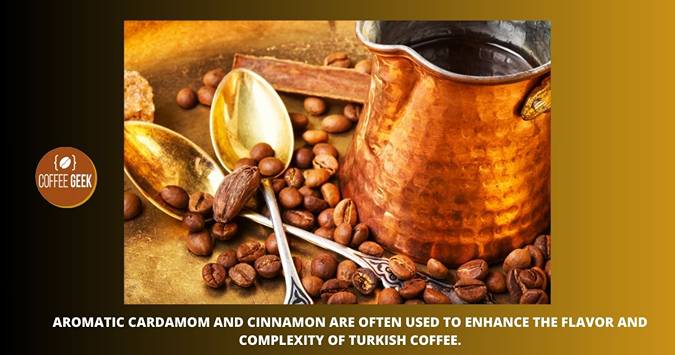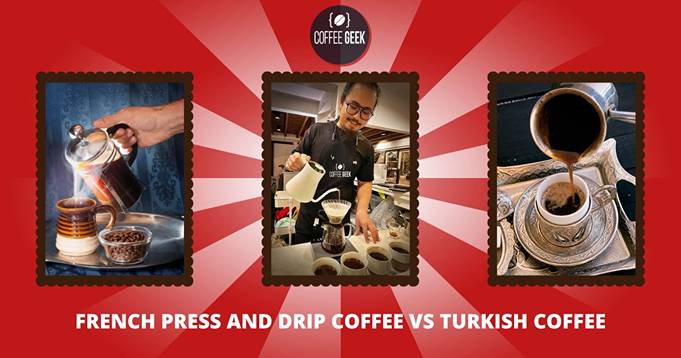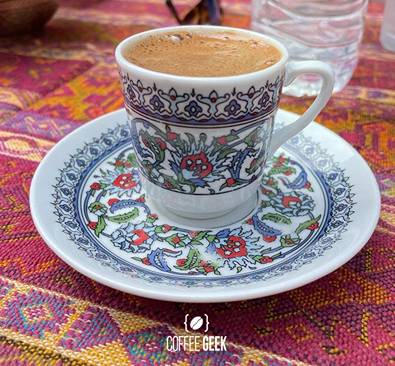I’ve always been a fan of trying different types of coffee from around the world, and one that has recently caught my attention is Turkish coffee.
With its unique brewing process and strong flavor, I couldn’t help but dive deeper into understanding this special type of coffee. Is Turkish coffee strong enough to awaken your senses?
The aroma and its unmatched taste make it truly stand out among other coffee types, and I cannot wait to share what I’ve learned with you all.
As I delved into the world of Turkish coffee, I discovered that its boldness and strength set it apart from others.
The traditional brewing process, which involves using a special pot called a cezve, adds to its strength and dense texture.
It’s not only about the taste, though; Turkish coffee has some interesting health benefits and concerns, making it a fascinating topic for coffee enthusiasts like me.
Key Takeaways
Turkish coffee stands out due to its unique brewing process and bold flavor
A traditional cezve pot is essential to achieve the desired strong taste and texture
The health benefits and concerns make Turkish coffee an intriguing option for coffee lovers
What Is Turkish Coffee – Is Turkish Coffee Strong?
History and Heritage
I am so excited to share with you the fascinating history and heritage of Turkish coffee!
Originating in the Middle East during the Ottoman Empire, Turkish coffee has been a significant part of the cultural experience for centuries.
The method of preparation has barely changed since the 16th century, making each coffee cup of this rich beverage a sip of history.

The Ottoman Empire, which ruled vast territories from the Middle East to Southeast Europe and North Africa, quickly embraced coffee.
With its distinctive brewing process, using very finely ground coffee beans without filtering, Turkish coffee gained fame not only in the empire but also across Europe and other parts of the world.
Coffeehouse Culture
One of the most exceptional aspects of Turkish coffee is the coffeehouse Turkish culture that developed around it.
Coffeehouses, or kahvehane, became the social hubs where people from all levels of society came together.
They were places where news, politics, and gossip were exchanged, fostering an essential means of socialization.
These coffeehouses still hold an essential place in the culture of the Middle East, and, of course, in Turkey itself.
Serving as spaces for gatherings, long conversations, and spending quality time with friends, Turkish coffeehouses epitomize the vibrant and tight-knit community that makes this part of the world so unique.

Not only is Turkish coffee rich in history and cultural significance but it is also considered stronger in taste and has more caffeine content as compared to regular coffee.
So if you have the chance to try this intense, flavorful, and refreshing beverage, I highly encourage you to do so – who knows, you could be partaking in a centuries-old tradition while creating new experiences for yourself!
The Brewing Process
Cezve and Coffee Beans
Oh, I’m so excited to share the brewing process of Turkish coffee with you!
First, let me tell you about the cezve, which is a small, usually copper pot with a long handle, specifically designed for brewing Turkish coffee.
Choosing the right cezve is important as it helps to distribute the heat evenly and create that sought-after foam.

For the coffee beans, I always prefer to use high-quality, dark roast arabica beans, as they result in an aromatic and delicious cup of Turkish coffee.
It’s essential to grind the beans extremely finely, almost to a powder consistency. Trust me, this will make all the difference in your brew!
Mixing and Heating
Now, let’s get to the exciting part – mixing and heating! First, I add cold water to the cezve, using about 100 ml (3.5 oz) of water per cup.
Then, I mix in the finely ground coffee and sugar according to my taste preference. Personally, I like my Turkish coffee with a little sweetness, so I add about 1-2 teaspoons of sugar.
Next, I place the cezve on a heat source, like a stove or gas burner, and patiently watch as the mixture warms. The key is to heat the coffee slowly since it influences the texture and flavor.
Once it starts to foam and rise, I remove it from the heat to avoid boiling – that’s when I know it’s almost ready.
Foaming and Serving

When the coffee starts foaming, I can hardly contain my excitement! First, I skim a little foam off the top and divide it equally among the cups.
Then, I carefully pour the rest of the coffee into each cup, aiming to preserve as much foam as possible.
After serving the coffee, it’s customary to enjoy it with a glass of water and a sweet treat like baklava.
The water refreshes the palate, allowing you to better appreciate the rich flavors of the unfiltered Turkish coffee.
And there you have it! The entire brewing process for a strong, delicious, and exciting traditional cup of Turkish coffee.
The next time you treat yourself to this delightful brew, take a moment to appreciate all the intricate details that go into creating such a wonderful experience. Cheers!
| Aspect of Strength | Description |
|---|---|
| Coffee Bean Type | Turkish coffee is typically made from finely ground Arabica beans, which are known for their mild and balanced flavor. However, the strength can vary based on the roast level and bean quality. |
| Brewing Method | Turkish coffee is brewed by boiling finely ground coffee beans along with water and sometimes sugar and cardamom. The resulting coffee is strong in terms of flavor and caffeine content due to the high coffee-to-water ratio and prolonged brewing process. |
| Concentration | Turkish coffee is known for its concentrated and robust flavor. It’s served in small cups, usually without milk, allowing the full strength of the coffee to shine. |
| Caffeine Content | Turkish coffee has a high caffeine content compared to other coffee types, as the fine grind and long brewing time extract more caffeine from the beans. It can be quite potent and may not be suitable for those sensitive to caffeine. |
| Taste Preferences | The strength of Turkish coffee is a matter of personal preference. Some people love its bold and intense flavor, while others may find it too strong and prefer milder coffee varieties. |
| Serving Size | Turkish coffee is traditionally served in small quantities, typically 1-2 ounces per cup. This small serving size helps to concentrate the flavor and strength. |
Strong Flavor and Taste
Filter and Coffee Grounds

I cannot stress this enough: Turkish coffee has such an incredibly strong flavor and taste! This intensity stems from its unique preparation method and longer extraction period.
Unlike regular coffee, which uses a filter, Turkish coffee does not separate the grounds from the liquid, resulting in a higher concentration of coffee solids in each serving.
I love the bold taste that comes from brewing it for around 8 minutes or more, which allows for extracting maximum flavor and more caffeine content. Turkish coffee does indeed pack a punch!
Cardamom and Cinnamon
Not only is the coffee itself bold, but the spices added to Turkish coffee elevate it to a whole new level of deliciousness!
Aromatic cardamom and cinnamon are often used to enhance the flavor and complexity of this already intense coffee. The spices blend perfectly with the coffee, creating a unique harmony of strong and balanced flavors.
Adding these spices to fully cooked coffee results in a taste that just can’t be replicated in any other way.

The rich blend of spices, along with the bold and bitter taste of the coffee, creates an experience that is nothing short of exhilarating. Each sip of Turkish coffee is a celebration of flavor and tradition.
If you’re a coffee lover like me, the intensity of the strong flavor and taste of Turkish coffee is an adventure worth exploring!
Comparing with Other Coffee Types
Espresso and Latte
I absolutely love exploring different coffee types! When it comes to espresso and latte, they are both made using an espresso machine with finely ground beans.
Espresso is a concentrated shot of coffee, with a bold, intense flavor. Lattes, on the other hand, are made by adding steamed milk to an espresso shot, which creates a creamier, more balanced taste.

Now, Turkish coffee has its own unique identity. It’s traditionally made in Istanbul, where it’s known for its rich flavor and higher caffeine content per fluid ounce compared to regular coffee source. You can read how much caffeine is in Turkish coffee here.
Unlike espresso and latte, there’s no need for an espresso machine – just a cezve, coffee, and water.
French Press and Drip Coffee
I’m sure you’re curious about how Turkish coffee compares to French press and drip coffee, so let’s dive in!
This press is a manual brewing method that steeps coarsely ground coffee in hot water before pressing the coffee grounds out. This creates a strong, full-bodied flavor.
Drip coffee, also known as filter or pour-over coffee, involves hot water flowing through a filter containing ground coffee. The result is a relatively milder taste.

It’s exciting to note that Turkish coffee retains its special characteristics even when compared to these popular methods. With finer grounds and no filtration, unfiltered coffee enhances the taste experience.
However, it can sometimes lead to over-extraction and bitterness if not brewed with precision.
Nescafe is a quick alternative to traditional coffee methods but may not capture the magic of a truly authentic Turkish coffee experience.
In summary, Turkish coffee stands out with its robust flavor and unique brewing process compared to espresso, latte, French press, and drip coffee.
It’s an exciting journey of taste and tradition for lovers, like me, to explore!
Health Benefits and Concerns
As a fan of making Turkish coffee, I’m excited to share some of the health benefits and concerns associated with this unique beverage.
Cholesterol and Blood Pressure
Something I learned is that Turkish coffee, which is unfiltered, contains compounds called diterpenes, such as cafestol, that can raise cholesterol levels.
According to Harvard Health, a regular cup of unfiltered coffee has 30 times more diterpenes than filtered coffee! So, for those with high cholesterol or blood pressure, it’s essential to enjoy Turkish coffee in moderation.
On the other hand, Turkish coffee is packed with antioxidants! These antioxidants can help our body fight against diseases like diabetes, heart disease, and even cancer.
Not to mention, they support the proper functioning of our vital organs, like the heart, brain, and liver, as mentioned on Art of Turkish Coffee.
Mental and Athletic Performance
Now, let me tell you why I love starting my day with Turkish coffee.
It provides a highly concentrated dose of caffeine, which is a well-studied, natural stimulant known for boosting athletic and mental performance.
Trust me, it gives me a kick to seize the day!
What’s even more exciting is that studies suggest that Turkish coffee can prevent neurological conditions like Alzheimer’s, Parkinson’s, dementia, and stroke.
In fact, MedicineNet stated that consuming adequate amounts of Turkish coffee is associated with a 27% reduced risk of developing Alzheimer’s disease.
Just remember to enjoy this delicious beverage in moderation, keeping track of your cholesterol levels and blood pressure, and Turkish coffee can provide some exciting health benefits while energizing your day!
Frequently Asked Questions
How does the caffeine content in Turkish coffee compare to espresso?
Oh, let me tell you, Turkish coffee is quite high in caffeine compared to espresso coffee!
It has 25 mg caffeine per fl oz, and the typical 2-1/2-ounce serving has 50 mg. An 8-ounce cup of Turkish coffee contains 165 mg of caffeine.
So, if you’re a more caffeine lover like me, Turkish coffee might just be your new favorite!
What are the differences in strength between Turkish coffee and regular coffee?
Well, Turkish coffee has a bold, intense coffee flavor due to the fine ground coffee boiling over in water. It differs from regular coffee in the brewed coffee method and consistency too.
Espresso coffee is made by forcing pressurized water through finely ground beans, while Turkish coffee is made by boiling grounds in a pot on the stove before being poured into cups.
I find the flavors and textures of Turkish coffee just so enchanting!
Is drinking Turkish coffee suitable for weight loss?
I would say, in moderation, Turkish coffee could be suitable for weight loss! Like all regular coffee types, it’s low in calories, especially if you don’t add sugar or cream.
Although the sugar and spices added to Turkish coffee can contribute to its unique flavor, be mindful of your overall sugar intake.
So, enjoy your perfect cup of coffee, but remember to balance it with a healthy diet and exercise.
What are the benefits of Turkish coffee for skin?
Turkish coffee’s high concentration of antioxidants may provide potential benefits for skin health, similar to other types of coffee.
Antioxidants are always welcome when it comes to protecting our skin from oxidative stress and environmental damage.
However, remember to drink in moderation and not rely solely on coffee for radiant, healthy skin.
Do I need to add sugar to Turkish coffee or is it already sweet?
Traditionally, Turkish regular coffee has sugar and spices added during the brewing process. But, it’s essential to know that you can adjust the sweetness to your preference.
I personally enjoy it sweet, but you can also have it without sugar or with just a little bit for a more subtle sweetness.
What makes Turkish coffee brands like Kurukahveci Mehmet Efendi and Selamlique popular?
Kurukahveci Mehmet Efendi and Selamlique are highly regarded for their quality and tradition.
I have found that these brands use premium coffee beans and time-honored recipes to create authentic and flavorful called Turkish coffee.
Their popularity lies in their commitment to providing an exceptional coffee experience that stays true to Turkish coffee’s rich history and Turkish culture.


